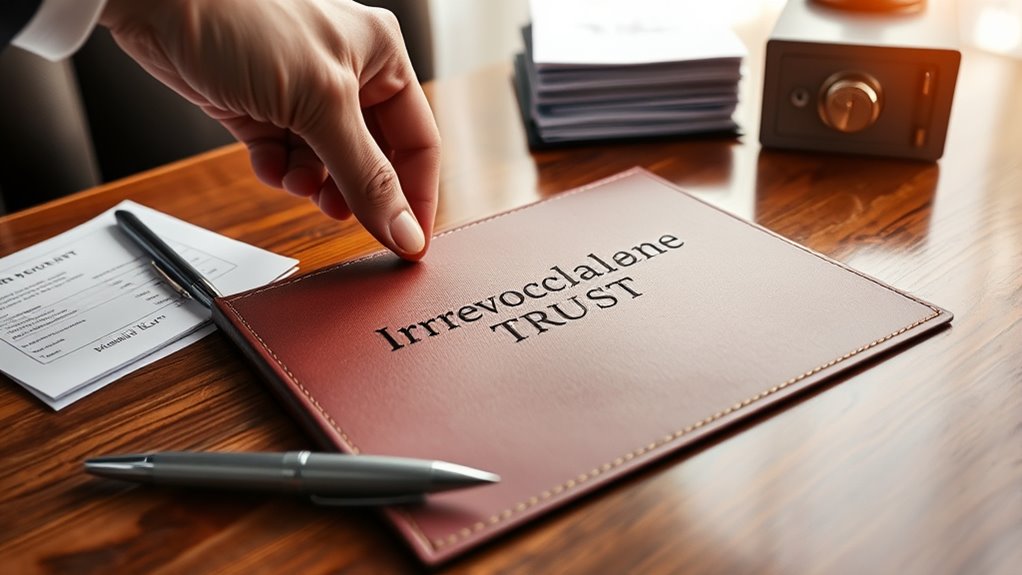An irrevocable trust helps protect your assets by removing them from your personal ownership, making it harder for creditors or litigants to claim them. By transferring assets into the trust, you establish a separate legal entity that limits your exposure to legal claims and judgments. While the trust offers ongoing protection and benefits like tax advantages and privacy, it’s essential to understand how to set it up correctly. Keep exploring to learn more about securing your assets effectively.
Key Takeaways
- Assets transferred into an irrevocable trust are legally owned by the trust, shielding them from creditors and legal claims.
- Properly funded trusts prevent assets from being included in probate, maintaining privacy and reducing delays.
- Irrevocable trusts limit the ability of creditors to access assets, offering ongoing protection even during legal disputes.
- Selecting the right trustee and regional legal resources enhances asset protection and compliance with laws.
- Clear initial planning and legal guidance ensure the trust effectively safeguards assets according to your long-term goals.
How Irrevocable Trusts Safeguard Your Assets

Irrevocable trusts protect your assets by removing them from your personal estate, making it harder for creditors or litigants to claim them. When you transfer assets into an irrevocable trust, you no longer own them directly; instead, the trust holds legal ownership. This separation limits your exposure to legal judgments and creditor claims, as the assets are no longer part of your personal assets. Additionally, because the trust is a separate legal entity, it can provide ongoing protection even if your financial situation changes or if you face lawsuits. By establishing an irrevocable trust, you create a barrier that prevents many creditors from reaching your assets, ensuring they are preserved for your beneficiaries or future needs. Proper trust management is essential to maintaining the effectiveness of this legal structure. Moreover, understanding regional legal resources can help you optimize the protection offered by your trust within your jurisdiction. Proper planning and knowledge of asset protection laws can further enhance the security of your assets within the trust. For example, asset segregation ensures that the trust’s assets remain distinct from your personal estate, reinforcing the trust’s protective barrier.
Key Benefits of Establishing an Irrevocable Trust

Establishing an irrevocable trust offers several significant advantages that can enhance your overall financial planning. First, it helps protect your assets from creditors and legal claims, providing peace of mind. Second, it can reduce estate taxes, ensuring more of your wealth goes to your beneficiaries. Third, it offers control over how your assets are managed and distributed, aligning with your wishes. Fourth, it provides privacy, keeping your estate details out of public records. With an irrevocable trust, you can set clear instructions for beneficiaries, minimize probate delays, and safeguard assets for future generations. Additionally, understanding retail hours can help you plan meetings with estate planners or visit financial institutions conveniently. These benefits make it a powerful tool for securing your financial legacy and achieving long-term estate planning goals.
Steps to Create and Fund an Irrevocable Trust

Creating and funding an irrevocable trust involves a clear, step-by-step process to guarantee your assets are protected and your wishes are met. First, you’ll work with an estate planning attorney to draft the trust document, specifying your goals, beneficiaries, and trustee. Next, you’ll transfer ownership of your assets—such as property, investments, or life insurance—into the trust, which is known as funding. This may require retitling titles or changing beneficiary designations. It’s essential to verify that all transfers are properly documented to maintain the trust’s integrity. Once funded, you’ll review the trust to confirm everything is in place. Regular updates or amendments aren’t possible, so accuracy at this stage is critical to achieving your estate planning objectives. Proper asset protection is a key benefit of establishing an irrevocable trust, ensuring your assets are shielded from future claims.
Common Misconceptions About Irrevocable Trusts

Many people believe that once an irrevocable trust is set up, it can’t be changed or influenced, but this is a common misconception. While it’s true that irrevocable trusts are generally difficult to modify, there are exceptions. Sometimes, with court approval or beneficiary consent, you can make adjustments. It’s also possible to add or remove beneficiaries or change trustees under certain circumstances. However, these changes often require careful legal procedures and aren’t as simple as editing a document. Understanding these nuances helps you see that, although the trust is “irrevocable,” flexibility exists in specific situations. This misconception can lead to unnecessary worries or missed opportunities for tailored estate planning. Knowing the facts can help you make informed decisions about your assets. Recognizing the legal procedures involved is essential for effective estate management, and creativity in legal strategies can facilitate problem-solving in complex trust modifications when necessary. Additionally, staying informed about trust laws can help you navigate potential adjustments more effectively, especially when considering trust amendment options that may be available. Being aware of the trust modification procedures can also assist in planning for unforeseen circumstances that require adjustments.
Considerations Before Setting Up an Irrevocable Trust

Before setting up an irrevocable trust, it’s important to carefully consider your goals and the long-term implications. Think about what you want to achieve—whether it’s protecting assets, minimizing taxes, or providing for loved ones. Once established, an irrevocable trust cannot be easily changed or revoked, so you need to be certain about your decisions. Consider how transferring assets will impact your estate and whether you might need access to those assets in the future. Evaluate who you want as beneficiaries and trustees, and understand the legal and tax consequences involved. Consulting with a qualified estate planning attorney can help you weigh these factors and ensure the trust aligns with your overall estate plan. Incorporating smart marketing strategies such as targeted communication and ongoing feedback can also help you effectively manage your estate planning process.
Frequently Asked Questions
Can I Modify or Revoke an Irrevocable Trust Once Established?
You might wonder if you can change or cancel an irrevocable trust after setting it up. Usually, once you create an irrevocable trust, you can’t modify or revoke it, as it’s designed to be permanent. However, in some cases, with court approval or if the trust includes specific provisions, you might make changes. It’s best to consult a legal expert to explore your options based on your trust’s terms.
How Does an Irrevocable Trust Impact Medicaid Eligibility?
An irrevocable trust can substantially impact your Medicaid eligibility. When you place assets into the trust, those assets are no longer considered yours, which may help you qualify for Medicaid benefits. However, Medicaid has a look-back period, usually five years, so if assets are transferred too recently, you might face a penalty period before qualifying. You should carefully plan and consult a legal expert to optimize your Medicaid eligibility.
What Are the Tax Implications of Transferring Assets Into a Trust?
When you transfer assets into a trust, you might face gift tax implications if the transfer exceeds annual exclusions. The IRS considers these transfers as gifts, potentially triggering gift tax filings. Additionally, if the trust is irrevocable, you lose control of those assets, and future income or gains may be taxed differently. It is crucial to consult a tax professional to understand how these transfers could impact your tax situation.
Who Should Be Appointed as Trustee in an Irrevocable Trust?
Oh, choosing a trustee—what a delightful task! You should appoint someone trustworthy, responsible, and capable of managing assets wisely, because this person will be your legal guardian in the financial domain. Ideally, pick a professional, like a lawyer or financial advisor, or a family member who understands your wishes. Remember, this decision shapes your trust’s success, so don’t just pick anyone; choose someone who’ll honor your intentions.
How Does an Irrevocable Trust Differ From a Revocable Trust?
You might wonder how an irrevocable trust differs from a revocable one. In an irrevocable trust, you give up control and can’t change or dissolve it easily, providing stronger asset protection and potential tax benefits. Conversely, a revocable trust allows you to retain control, make changes, or revoke it at any time. This flexibility makes revocable trusts more suitable for estate planning, while irrevocable trusts are for more permanent asset protection.
Conclusion
By understanding how irrevocable trusts shield your assets, you’re carving out a fortress for your legacy. These trusts act like a sturdy shield, protecting your wealth from unforeseen storms and future claims. With careful planning and informed decisions, you hold the keys to a secure financial future. Embrace this powerful tool, and you’ll be steering your estate with confidence, ensuring your assets stand resilient like a fortress amid life’s unpredictable tides.









